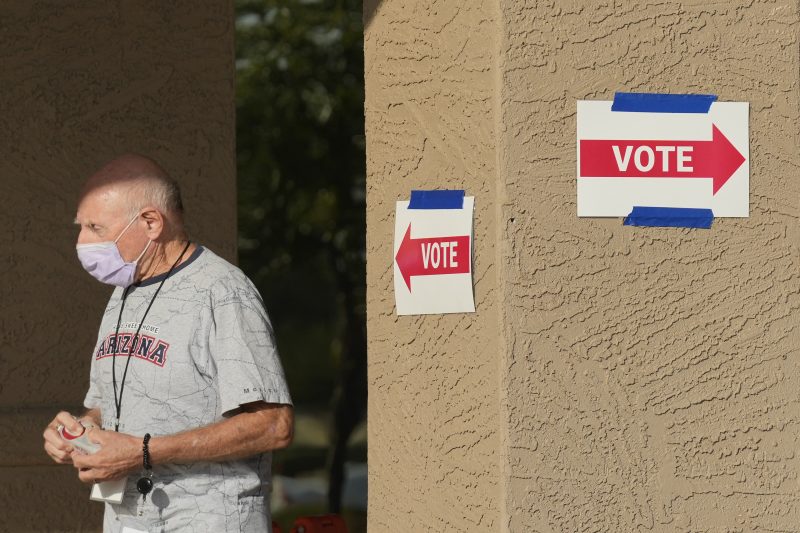The Supreme Court cleared the way Thursday for a provision of Arizona law that requires proof of citizenship to register to vote in some circumstances, the first time the high court has weighed in on a voting dispute in the run-up to the presidential election.
The high court’s 5-4 action follows an emergency appeal by the Republican National Committee and lawmakers in Arizona, which is considered an important swing state in the election. Polls show a tight contest there between Democrat Kamala Harris and Republican Donald Trump.
As is typical in emergency orders, the majority did not explain its reasoning for allowing the citizenship requirement to take effect for state voter registration forms.
The order means Arizona election officials must reject state registration forms if voters don’t provide documentation of citizenship. However, the justices kept on hold provisions of the law that could have disqualified voters who register separate federal forms from casting ballots in a presidential contest in person or by mail.
In other words, Arizona voters can still register using a federal form, without proof of citizenship, and vote in the presidential contest.
Conservative Justice Amy Coney Barrett, along with liberal Justices Sonia Sotomayor, Elena Kagan and Ketanji Brown Jackson, said they would have denied the request from Arizona lawmakers. Justices Clarence Thomas, Samuel A. Alito Jr. and Neil M. Gorsuch said they would have gone further and allowed the federal-form provisions of the 2022 law to take effect.
Republicans have made noncitizen voting a focus in 2024, despite studies showing it is extremely rare. They are pushing a national proof of citizenship bill, and a handful of states have measures related to noncitizen voting on November’s ballot.
Republicans say the measures are necessary to prevent any instances of noncitizens seeking to cast ballots. Democrats have decried the efforts, however, arguing that they are intended to preemptively question the legitimacy of the upcoming election.
The efforts could result in eligible voters being removed from voting rolls, Democrats argue. They say the measures are ultimately about revving up conservative voters on the hot-button issues of immigration and voter fraud.
Election law expert Richard Hasen, a UCLA law professor, said the court’s action would “make it moderately more difficult” for some voters and “for no good reason, because noncitizens are not voting in large numbers.”
Wendy R. Weiser of the Brennan Center for Justice’s democracy program said the change in registration requirements three months before the election will result in a scramble for voters, election officials and voting rights groups.
“There needs to be a massive education effort for people who do not have documentary proof of citizenship for them to understand the correct way to register to vote if they want to be able to vote in the federal elections,” Weiser said. “There’s a real risk of confusion when there are two different voter registration forms.”
Arizona Secretary of State Adrian Fontes (D) agreed. He emphasized that state election officials would abide by the court’s decision and “implement these changes while continuing to protect voter access.”
Gina Swoboda, chair of the state Republican Party praised the decision, calling it a “tremendous victory for every Arizona voter who demands confidence that our elections are protected from non-citizen interference. The Supreme Court’s ruling ensures that Arizona can uphold the integrity of its elections.”
The Biden administration and a number of Arizona groups sued to block the law in July 2022, arguing that the federal National Voting Rights Act preempts the Arizona law’s requirements related to the federal voter registration form. The act requires voters to attest they are citizens under penalty of perjury but does not require them to submit proof.
Those challenging the law also pointed to a 2013 Supreme Court ruling that said states violate the Voting Rights Act if they reject a federal voter registration form by requiring a person to submit proof of citizenship. Republicans argued that the ruling does not apply in the current case.
The voting rights groups additionally argued that a 2018 consent decree in Arizona preempted the rules requiring proof of citizenship for state registration forms, a contention rejected by the Republicans.
A trial court judge blocked the Arizona law in 2023, citing the rationale put forward by the Biden administration and the state groups.
The Republicans asked the Supreme Court to put the district court’s decision on hold pending an appeal to the U.S. Court of Appeals for the 9th Circuit. They also requested a prompt ruling, saying the state has an Aug. 22 deadline to resolve litigation related to the election because counties need to begin printing ballots.
“The district court’s injunction is an unprecedented abrogation of the Arizona Legislature’s sovereign authority to determine the qualifications of voters and structure participation in its elections,” the Republicans wrote in their filing.
U.S. Solicitor General Elizabeth B. Prelogar argued on behalf of the Biden administration that “judicial intervention at this stage would undermine the orderly administration of the election.”
Such action could risk the disfranchisement of thousands of voters who have already registered to vote using the federal form, Prelogar wrote in her brief.
Noncitizen voting is illegal in federal elections and allowed only in some local municipalities and jurisdictions. Trump has often falsely claimed that noncitizen voting cost him the 2020 election and narrowed his margin of victory in the 2016 presidential contest.
A handful of cities, including Washington, D.C., allow noncitizens to vote in municipal elections. But five states have amended their state constitutions since 2020 to ensure noncitizens can’t vote in local or state elections. This fall, Wisconsin, Iowa, Kentucky and Idaho will vote on ballot measures to enact constitutional bans on noncitizen voting.
Patrick Marley and Yvonne Wingett Sanchez contributed to this report.

